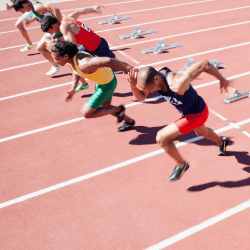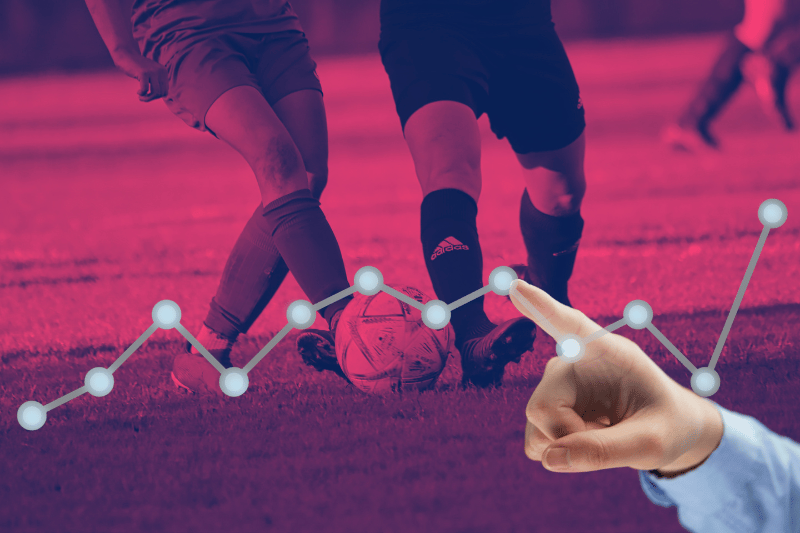
The Olympic Games have always been a symbol of athleticism, and international unity throughout the world. The same spirit has resonated from Team USA as well. Their pursuit of excellence in the Olympics has now become a tradition that has defined their sporting identity. Over the years USA has sent many athletes to the Olympic Games, dating back to 1896 when the first modern Olympics was held. Team USA is one of the most successful medal-winning countries in Olympic history with 2,959 medals combined in summer and winter Olympics. In recent years, one aspect has played a critical part in Team USA's success: sports data. The strategic application of data analytics has transformed how athletes practice, coaches plan, and teams prepare for the world's most famous athletic event.
Sports Data in Olympic Preparation:
As the world of sports evolves further the dependence on data has seen an increasing trend as well. Olympic athletes are tapping into the power of sports data to be better prepared for the upcoming Paris Olympics 2024. These next-gen Olympic athletes have realized the importance of sports data and have since become dependent on it for performance enhancement. Coaches are analyzing past sports data to track player performance and compare the same with competition while mapping out trends to come up with novel ways to improve performance.
 Wearable Technology and the Olympics
Wearable Technology and the Olympics
Innovative tools like Wearable technology offer detailed analytics about the athlete’s movements aiding coaches with training regimes and even mapping out areas of improvement. It has also helped coaches develop personalized regimes that can address specific player or team weaknesses and help capitalize on their strengths. For example, wearable tech can offer detailed biometric data for athletes including heart rates, speed, force and more giving coaches and players a wide range of data across a variety of sports, including stride rate and stroke rate in running, swimming, and rowing, as well as ground contact time and force analysis in speed skating and jumping.
It might also be utilized during training, since 3D modeling delivers representations from all angles, ensuring that athletes never miss anything live on the court and helping players to better grasp what has to be improved after each match.
The USA Surfing group has also used big data approaches to gain an advantage in the past, they used machine learning and artificial intelligence for a variety of initiatives with the aim to improve athlete's performance on the waves. They had also gathered physiological data such as cardiovascular output, sleep habits, heart rate variability, and the incidence of certain injuries in the hopes that a greater knowledge of these elements would lead to higher competition success.
Team USA is at the forefront of integrating sports data with their performance. From using basic stats to comprehensive data sets, athletes and coaches have gained better insights into their performance patterns and injury prevention.
Mental Support and psychological dimensions
The Olympics is not just a platform where athletes showcase their physical ability but the mental pressure of the game is just as important. Paris Olympics 2024 might just be a two to three-week event from 26 July and 11 August but athletes put in years of hard work and consistency to represent their country at the most important sporting event of the world.
Aside from the physical parts of training, sports data is increasingly being utilized to address the mental and psychological aspects of athletic performance. As the pressure of competing on the Olympic stage is enormous, and mental resilience is key to success. Team USA depends on the power of data to assess an athlete's mental status by finding out stressors and developing strategies to stay focused and composed under pressure. Analyzing data on an athlete's psychological reactions during training and competition enables coaches to design mental conditioning regimens that improve performance in high-pressure circumstances. This approach further develops their mental fortitude and increases their chances of success at the Olympic Games.
 As Team USA pursues Olympic gold, the use of sports data in training and preparation emerges as a critical aspect of their success. The strategic application of data analytics has changed the way athletes and coaches approach games, creating a competitive edge that extends beyond physical ability. Thus improving Team USA's potential to excel on a global scale. As technology advances, the significance of data in Olympic sports is certain to grow, creating new opportunities for innovation and development.
As Team USA pursues Olympic gold, the use of sports data in training and preparation emerges as a critical aspect of their success. The strategic application of data analytics has changed the way athletes and coaches approach games, creating a competitive edge that extends beyond physical ability. Thus improving Team USA's potential to excel on a global scale. As technology advances, the significance of data in Olympic sports is certain to grow, creating new opportunities for innovation and development.
Just as Team USA has propelled themselves to the top of the Olympic podium with an insightful use of Olympic sports data. The untapped potential of Sports data feeds is just a click away with Data Sports Group- one of the leading sports data providers in the industry. Tap into the power of Sports data API and American football data feed and excel in this era of data-driven excellence.










